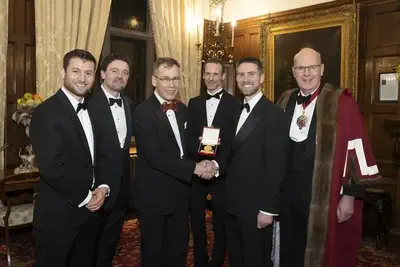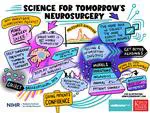Posts
CAI4CAI members and alumni are leading the organization of the new edition of the cross-modality Domain Adaptation challenge (crossMoDA) for medical image segmentation Challenge, which will runs as an official challenge during the Medical Image Computing and Computer Assisted Interventions (MICCAI) 2023 conference.
The four co-founders of Hypervison Surgical, a King’s spin-out company, have been awarded the Cutlers’ Surgical Prize for outstanding work in the field of instrumentation, innovation and technical development.

The Cutlers’ Surgical Prize is one of the most prestigious annual prizes for original innovation in the design or application of surgical instruments, equipment or practice to improve the health and recovery of surgical patients.
This video presents work lead by Christopher E. Mower. OpTaS is an OPtimization-based TAsk Specification Python library for trajectory optimization and model predictive control. The code can be found at https://github.com/cmower/optas. This work will be presented at the 2023 IEEE International Conference on Robotics and Automation (ICRA).
We are working to develop new technologies that combine a new type of camera system, referred to as hyperspectral, with Artificial Intelligence (AI) systems to reveal to neurosurgeons information that is otherwise not visible to the naked eye during surgery. Two studies are currently bringing this “hyperspectral” technology to operating theatres. The NeuroHSI study uses a hyperspectral camera attached to an external scope to show surgeons critical information on tissue blood flow and distinguishes vulnerable structures which need to be protected. The NeuroPPEye study is developing this technology adapted for surgical microscopes, to guide tumour surgery.
This video presents work lead by Christopher E. Mower. The ROS-PyBullet Interface is a framework between the reliable contact simulator PyBullet and the Robot Operating System (ROS) with additional utilities for Human-Robot Interaction in the simulated environment. This work was presented at the Conference on Robot Learning (CoRL), 2022. The corresponding paper can be found at PMLR.
Muhammad led the development of FastGeodis, an open-source package that provides efficient implementations for computing Geodesic and Euclidean distance transforms (or a mixture of both), targetting efficient utilisation of CPU and GPU hardware. This package is able to handle 2D as well as 3D data, where it achieves up to a 20x speedup on a CPU and up to a 74x speedup on a GPU as compared to an existing open-source library that uses a non-parallelisable single-thread CPU implementation. Further in-depth comparison of performance improvements is discussed in the FastGeodis documentation.






![[Job] Research Coordinator - King's College Hospital NHS Foundation Trust](/post/2022-12-01-researchcoordinator/featured_hu_a65c931746e06099.webp)

![PhD opportunity [February 2024 start] on "Incorporating Expert-consistent Spatial Structure Relationships in Learning-based Brain Parcellation"](/post/2022-11-15-twaiparcellation/featured_hu_11228d5ca49d472d.webp)